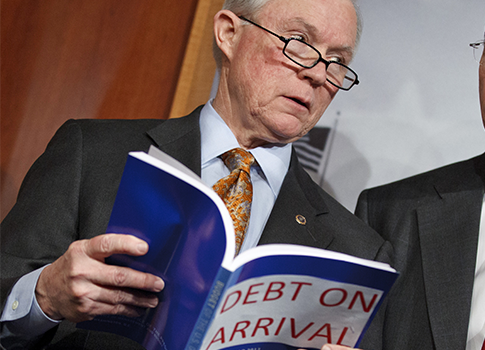A top Republican is insisting that party leaders retain more than $2 trillion in spending cuts agreed to in last year’s budget agreement as negotiations over the so-called fiscal cliff heat up.
Sen. Jeff Sessions (R., Ala.), ranking member on the Senate Budget Committee, sent a letter to Republican and Democratic leaders last week urging them not to exceed the spending caps outlined in the Budget Control Act (BCA) of 2011, legislation passed last year following a showdown over the federal debt ceiling.
Those caps were intended to slow the rate of spending growth over the next decade and reduce the federal deficit by $2.1 trillion, which is equal to the amount by which Congress agreed to raise the debt limit.
Sessions is concerned that the caps could be scuttled in an attempt to negotiate a deal to avoid going over the "fiscal cliff," the term used to describe more than $600 billion in automatic spending cuts and tax increases scheduled to occur on Jan. 1, 2013.
"As you know, the BCA signed into law August of last year required that spending be reduced by $2.1 trillion in exchange for an immediate $2.1 trillion increase in the debt limit," Sessions wrote. "Congress must reorganize and reprioritize these cuts, but we must not retreat from the overall amount Congress agreed to and that the President signed into law."
Sessions noted that party leaders are likely to discuss a host of measures, such as an extension of unemployment insurance, which could increase spending above the levels outlined in the BCA.
"Offsets for any of these changes must also be achieved through real savings, not gimmicks like counting baseline savings from future war spending that is not expected to occur," he wrote.
President Barack Obama and his Democratic allies are notorious for their reliance on accounting tricks that artificially inflate the magnitude of savings in their proposals.
Sessions and other Republicans have also expressed concern that the secretive nature of the fiscal cliff negotiations could ultimately reward Democrats for their refusal to endorse a viable plan to solve the nation’s burgeoning debt problem.
